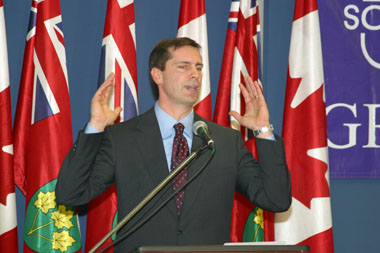
Education and Early Career
As a registered nurse and a lawyer specializing in labour law, Meilleur practised in these two fields for several years. She also served on the Ottawa-Carleton Regional District Health Council, the Champlain District Health Council, the Ottawa-Carleton Children’s Aid Society and the Vanier Housing Corporation.
Elected to Vanier’s municipal council in 1991, Meilleur remained in office when the new, amalgamated City of Ottawa was created in 2000. While working as an Ottawa city councillor, she represented the municipal council on the French Language Services Advisory Committee. In 2001, Meilleur became the deputy mayor of Ottawa. During her years in municipal politics, she was involved in several projects, such as the construction of the light rail (O-Train) network and the revitalization of both Montreal Road and the Byward Market. It was also as Ottawa city councillor that Meilleur was involved at the end of the 1990s in the remarkable fight to save the Montfort Hospital, the only hospital west of Quebec City to offer university training in French (see SOS Montfort).
MPP and Minister
Meilleur was first elected to the provincial legislative assembly as a Liberal in the Ontario riding of Ottawa-Vanier in 2003. She was successively Minister of Culture (2003-2006), Minister of Community and Social Services (2006-2011) and Minister of Community Safety and Correctional Services (2011-2014) in Dalton McGuinty’s government. Re-elected in the 2014 provincial election, she was appointed Attorney General of Ontario (2014-2016) in Kathleen Wynne’s government. Meilleur was the first francophone to occupy this post. She was also the Ontario politician who held the position of Minister responsible for Francophone Affairs the longest. She occupied this role for 13 years, from her entry into the Liberal cabinet in 2003 until she resigned as MPP and minister during the cabinet shuffle in June 2016.

Achievements
Standard-bearer for the affirmation of Franco-Ontarians, Meilleur substantially improved the French Language Services Act (commonly known as “Bill 8”). She came up with the idea for the Office of the French Language Services Commissioner of Ontario, made up of independent commissioners. It was also thanks to her initiative that the commissioner gained the status of Officer of the Legislative Assembly of Ontario, which increased the Office’s impartiality, status and moral authority. Meilleur’s term at Francophone Affairs was also marked by the following achievements: establishing the Provincial Advisory Committee on Francophone Affairs; increasing the number of regions and establishments designated to offer services in French; piloting the project designed to encourage straightforward access to French at the Ottawa courthouse; regulating the designation of organizations offering services to the public in French pursuant to the French Language Services Act; making the Franco-Ontarian television station, TFO, a self-governing agency; designating 25 September as Franco-Ontarian Day (see Franco-Ontarian Flag); and commemorating, in 2015, the 400th anniversary of the French presence in Ontario.

It is also thanks to Meilleur that Ontario adopted laws supporting the social inclusion of persons with intellectual disabilities (see Disability). In addition, she was among those who championed efforts to amend the Ontario Heritage Act, which restricts, among other things, the demolition of buildings that are designated under the Act as heritage structures. She also successfully managed the process that saw Ontario as the first Canadian province to require that automatic sprinkler systems be installed in long-term care facilities for seniors and other vulnerable persons. Finally, Meilleur provided the impetus for a number of initiatives that have improved access to justice in Ontario.
Political Heritage and Vision for La Francophonie of Ontario
Meilleur was the very first minister in Ontario to attend a Sommet de la Francophonie(in Quebec City in 2008). She worked to promote the idea of Ontario becoming a participating government in the Organisation internationale de la Francophonie (International Organisation of La Francophonie). In November 2016, Ontario was finally granted the member status of “Observer.”
For Meilleur, immigration was a key factor in the valorization and maintenance of the francophone presence in Ontario. Since francophone immigrants are generally highly qualified, she believed it was critical for the professional credentials of newcomers, from other provinces as well as other countries, to be evaluated fairly. Ontario consequently created several programs designed for professionals who had been trained abroad. The other challenge in Ontario, according to Meilleur, was remedying the lack of services in French (particularly in the school system) in large centres such as Toronto, Hamilton, Windsor and Sarnia. Even though several new community organizations were created in the last years of Meilleur’s mandate — offering healthcare and support in French to children, youth and female victims of violence — much work remains to be done. Nonetheless, Meilleur left the Office of Francophone Affairs in a healthy state and exited political life saying that, in light of recent gains, she was confident that the future of Franco-Ontarians was the most promising it had ever been.
On 15 May 2017, Prime Minister Justin Trudeau suggested Madeleine Meilleur as the next Commissioner of Official Languages. In the days and weeks that followed, this choice was heavily criticized by the opposition parties and by various francophone groups, who saw the nomination as highly partisan. The Commissioner of Official Languages is an independent officer of Parliament, and the person selected for this position must be impartial in order to defend the linguistic rights of Canadian citizens. In the wake of the controversy surrounding her nomination, Meilleur withdrew her candidacy before it could be approved by the House of Commons and the Senate.
Awards and Honours
- Community Builder Award, United Way (2001)
- Prix d’excellence (Award of Excellence), Réseau socioactif des femmes francophones (Francophone women’s social action network) (2002)
- Chevalier de la Légion d’honneur (Knight of the Legion of Honor), Government of France (2012)
- Prix de reconnaissance (Achievement Award), Assemblée de la francophonie de l’Ontario (Assembly of La Francophonie of Ontario) (2013)

 Share on Facebook
Share on Facebook Share on X
Share on X Share by Email
Share by Email Share on Google Classroom
Share on Google Classroom
